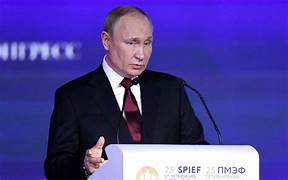The St. Petersburg International Economic Forum (SIPEF) attracted participation from 139 countries, underscoring a growing demand for an economic platform that caters to the needs of the global south independently of Western influence. Seen as a credible alternative to the World Economic Forum, SPIEF drew significant interest from Asia, particularly the Middle East, eager to bolster relations with Russia.
Russia’s assertive stance, amidst NATO challenges, resonated at SPIEF, facilitating favourable agreements in sectors like oil, energy, and infrastructure. The ongoing Russia-Ukraine conflict has bolstered Russia’s geopolitical clout in the Middle East, where leaders are increasingly looking towards Moscow for stability amid perceived US-led regional discord. This shift has cultivated a positive sentiment towards Russia among Middle Eastern populations, contrasting with skepticism towards US policies in the region.
The 27th St. Petersburg International Economic Forum recently convened in Russia, serving as a pivotal platform for global economic discourse, investments, and networking. Often referred to as the “Russian Davos,” western media highlights the growing importance of the Russia-led forum on one hand while simultaneously trying to undermine its relevance in comparison to West-led forum, by calling it another Davos, thus implying that the Davos forum enjoys a superior position.
SPIEF has evolved significantly since its inception in 1997, expanding from a regional initiative to a prestigious international event under the patronage of the Russian President since 2006. Notably, SPIEF-2024 hosted Oman as its guest country, continuing its tradition to honour key regional players. Oman utilized this platform to solidify bilateral agreements with Russia, particularly in IT, food production, and broader strategic partnerships. The forum attracted 21,300 delegates, highlighting its global significance and appeal, especially for Middle Eastern nations seeking to bolster economic ties with Russia.
Economic collaboration between Russia and MENA countries, with trade reaching $50 billion in 2023, focused on energy, agriculture, infrastructure, and technology. Russian entities like Gazprom and Rosneft played pivotal roles in MENA’s oil and gas sectors, while Russian grain exports to the region totaled 10 million tons last year. Additionally, bilateral investments in Russian infrastructure projects from MENA reached $5 billion, underscoring mutual economic interests.
SPIEF serves as a significant challenge to the dominance of the Global North by providing a platform where emerging economies and regional powers, including those from the Middle East and Asia, assert their influence.
Unlike traditional Western-centric forums like the World Economic Forum, SPIEF emphasizes multipolarity and inclusive global economic dialogue. By attracting leaders and investors from diverse backgrounds and regions, SPIEF is promoting alternative perspectives on global economic governance and development. This diversity of voices challenges the conventional norms and policies often dictated by the Global North, advocating for a more balanced and representative approach to international economic cooperation.
Russia’s participation in SPIEF-2024 also underscored its efforts to reclaim its status as a significant global power. Amid discussions on economic cooperation and political stability, there was a palpable focus on Russia’s resurgence on the international stage. Putin’s address highlighted Russia’s expanding trade partnerships and strategic initiatives, aiming to strengthen its influence globally.
BRICS, comprising Brazil, Russia, India, China, and South Africa, stands as a pivotal alliance advocating for multipolarity and equitable global governance. Moreover, interest in BRICS membership is increasing with countries like Saudi Arabia, UAE, Egypt, and Iran eyeing membership to enhance global economic and political influence. Discussions at SPIEF highlighted the importance of BRICS in countering unilateralism and promoting inclusive economic policies.
Russian President Vladimir Putin reaffirmed BRICS’ role in promoting global stability during SPIEF-2024, emphasizing Russia’s expanding trade partnerships and cooperative endeavors. He underscored that a significant portion of Russia’s trade now stems from nations across Asia, Africa, and Latin America, indicating a strategic diversification in economic engagements.
SPIEF-2024 also addressed geopolitical concerns, including global conflicts and regional issues such as Israel-Palestine relations. Discussions highlighted apprehensions about nuclear conflicts and criticized Western actions impacting international norms.
The forum underscored its pivotal role as an international platform fostering dialogue and cooperation amidst evolving global dynamics. It highlighted the necessity for multilateral cooperation to address contemporary global challenges, reflecting changing alignments in economic and political spheres.
In conclusion, SPIEF-2024 not only reinforced Russia’s role as a key player in global economic affairs but also underscored its commitment to facilitate inclusive international dialogues and partnerships, it presented itself as a sustainable alternative against west-led initiatives and norms that hinder the growth of the global south.







